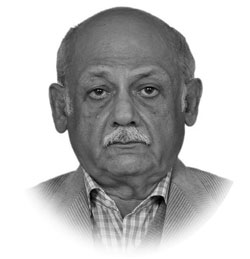Pakistan: Failed State,collapsing State or a weak State
SOCIAL scientists, political analysts and scholars have been debating for a long time if Pakistan can be classified as a failed state, a collapsing state or a weak state.
There have been many points of view and predictions about the future prospects of the country whether it will survive as an independent country or end up on the dust heap of history like the (erstwhile) Soviet Union and other countries of Eastern Europe.
Consensus reached after detailed examination of the socio, political and economic data points to the fact that Pakistan is neither a failed state nor a weak state but a troubled state.
Since its very birth in 1947, Pakistan has had its share of trials and tribulations, some natural and some man-made.
It has lived through military coups, wars, insurgencies, earthquakes, religious extremism, sectarian conflict, ethnic troubles, revolts and many other challenges to the writ of the government of the day.
Today Pakistan stands at a crossroads and is facing a very decisive phase during its history.
Today the threat of religious terrorism, extremism and the instability along its borders with India and Afghanistan are the main factors to determine the future political, social and economic prospects of the country and the nation.
The end of the cold war coinciding with the withdrawal of the Soviet Union from Afghanistan resulted in the abandonment of political and economic support by the USA and the European powers leaving Pakistan to fend for itself.
It cannot be denied that the present wave of Islamic Jihad and terrorism in the country is a bye-product of Pakistan’s support and training of the Afghan Mujahedeen during the Soviet occupation of Afghanistan.
It is also a fact that Pakistan’s Afghan policy during that time had complete political and financial support of the USA, European Union, Saudi Arabia and a large number of Islamic countries across the world.
The scourge of terrorism can also be attributed to the influx of over four million Afghan refugees who managed to promote their conservative Islamic culture in the Pakistan society making the country more susceptible to religious extremism.
Laws based on Islamization of society during the Zia era, the mushroom growth of Deeni Madaris all over the country and state support and backing for some religious extremist militant groups also led to the present state of religious extremism and intolerance in our society.
The accepted definition of a failed state is that states collapse or fail when they are unable to provide basic human security to its citizens; for example, protection of human rights, freedom from violence and the fear of persecution.
Somalia, Afghanistan, South Sudan, Syria and Iraq have become failed states because they have failed to provide human security to their citizens.
Nevertheless a nuclear power, unstable, fundamentalist and moving towards Islamic extremism Pakistan a critical ally of the western democracies in the fight to eliminate religious terrorism from the world, cannot be termed as failed state.
Pakistan has lost over seventy five thousand lives to extremist religious militants and suffered huge damage to property and infrastructure.
In the last twenty years, there have been a succession of weak governments that failed to guard its own senior officials like Salman Taseer and Shahbaz Bhatti condemned and killed by Islamic militants on the charge of supporting people guilty of blasphemy.
Sri Lanka, a nation of extremely civilised, cultured and educated people, suffered the wrath of Islamic militants just days ago in Sialkot.
Pakistan once again is under the microscope this time because of a chilling and horrifying case of Islamic vigilante justice when a Sri Lankan man was brutally tortured and then set on fire while still breathing.
The victim was called Pryiantha Kumara working as a production manager in a private factory in Sialkot.
His only crime was that he had removed the posters of a militant group from the notice board of the factory.
The government is currently enjoying a honeymoon period with some Islamic militant groups like the TLP and the TTP.
The dangerous policy of embracing and supporting religious extremists will definitely spell disaster for the country.
If his policy continues, this country could very easily turn into a failed state from a troubled state.
The state of anarchy prevalent in Pakistan during the last two decades shows that religion, politics and state policy are inextricably linked and it is almost impossible to exclude fundamentalism from society because of the incompetence and incapability of the state.
The very recent happenings in Sialkot when a Sri Lankan national was butchered by an incensed crowd on the suspicion of blasphemy is another proof of the state’s inability to deal with the issue of extremism.
—The writer is Professor of History, based in Islamabad.










